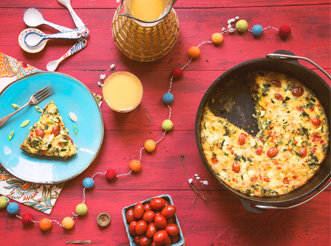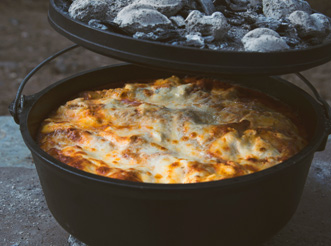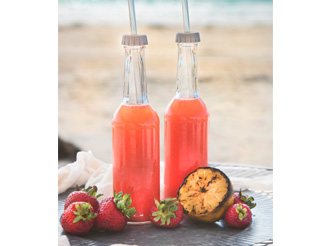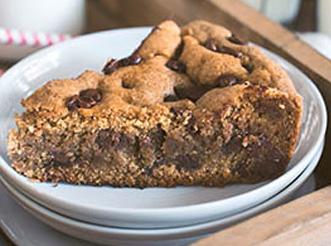Cooking outdoors doesn’t have to be boring and bland. A San Diego cookbook author and blogger shows us how to take campfire meals to new heights.
San Diego resident Laura Bashar and her family embraced the camping life 10 years ago when her eldest son joined Cub Scouts. When her husband became a scoutmaster, Bashar decided to go beyond beans and burgers and introduce gourmet meals around the campfire.
“I was always motivated to take our camp food to the next level,” she says. “Most camping cookbooks use a lot of processed ingredients or specialize in one cooking method. I wanted to show people that you can eat well while camping using a variety of different cooking methods.”
In Bashar’s new The Camp and Cabin Cookbook (Countryman, 2018, $24.95), which features more than 100 recipes that can be prepared outdoors, she shows campers how.
How did you come up with the idea for a camping cookbook?
It was our Scout family that inspired me to write this cookbook. Our communal camp meals were definitely not hot dogs and hamburgers, but rather kebabs and chicken cacciatore. As my boys got older and joined the Boy Scouts, I no longer went on the camping trips, and they had to cook for themselves. My boys wanted to eat good food, so I helped them with meal planning. I wrote about my experiences on my Family Spice blog (familyspice.com), and my readers were excited about camp food.
Your recipes promote fresh ingredients. Is it challenging to use fresh ingredients while camping?
I cook every day at home using fresh ingredients, so I did not find it difficult to cook with them while camping. It is all a matter of what you are used to eating. My kids know that delicious food takes a little extra time to prepare. And, when you are camping, hiking, kayaking, or active outdoors, you get hungry! No one wants to be fed boring and bland food.
How early should you start meal prep for a camping trip?
I usually plan the menu a couple of weeks before our camping trip. Sometimes, it is as simple as brainstorming ideas in my head while driving the kids to school or running errands. I set the menu the week before, and that’s when I start the shopping. I don’t buy fruits and vegetables until a day or two before the trip.
Are your daughter and two sons involved with meal prep and cooking?
My kids have always been involved with the meal prep in some way. Both of my boys learned to cook through Scouting. I taught my daughter and her friends to cook at my cooking camps.
All of my kids have helped with tasks like chopping vegetables and starting the coals. As they got older, they were responsible for more difficult jobs. And all three were taught about food safety, knife skills, and how to be safe around fire.
Do you have tips on packing ingredients for a camping trip?
Food safety is a must when cooking outdoors, so you need to store perishables in a cooler. To keep things from getting soggy, I use freezable ice packs as well as resealable bags filled with ice. This not only keeps things from soaking in water but also keeps ice clean for your drinks.
The method to pack your cooler is important. This is what works for us. With larger coolers, we line the bottom with ice packs, then place the heavier items and foods that absolutely must remain cold in first, like raw meat and dairy products. You can also freeze bottles of water and use them as ice packs. When the ice in the bottle melts, you have cold drinkable water.
I also place resealable bags filled with ice in the center and on the sides of the cooler to help maintain the cold temperature. As I layer items in, I finish with delicate vegetables and eggs on the top layer of the cooler and add some small packs filled with ice.
Some of your recipes feature a Dutch oven. Why is it a good tool for camp cooking?
A Dutch oven is awesome because you can make practically anything in it. You can use it to feed a small family or a large crew. Think of the Dutch oven as a mini oven. It is made of cast iron, which is perfect for retaining heat, making the inside of the Dutch oven perfect for stews, pizzas, lasagna, cakes.
What special tools do you need to cook with a Dutch oven?
When you cook with a Dutch oven at a campsite, you also will need other tools, like a chimney starter, long metal tongs, a lid lifter, sturdy oven mitts, briquettes, and a drain pan. The chimney is used to light up the briquettes. The long metal tongs are great not only for cooking but also for positioning hot briquettes above and beneath the Dutch oven.
The Dutch oven gets incredibly hot [when] cooking food. You will need sturdy oven mitts—not the kind you have at home—to handle it. A lid lifter helps you lift the hot Dutch oven lid so it doesn’t tip and get ash into your food.
If you don’t have access to a fire ring, you can use an oil drain pan instead. The drain pan holds the hot coals and hot Dutch oven so the ground underneath doesn’t burn. Never put hot coals directly on the ground.
What’s the best way to clean a Dutch oven at a campsite?
Clean your Dutch oven the same way you clean a cast-iron skillet: Use warm water and a sponge, but no soap. The soap removes the seasoning from the cast iron. Clean a Dutch oven immediately after you are done cooking so the food doesn’t stick. But that doesn’t always happen, so we typically add water into the oven and slowly warm it up while we clean it.
After washing, immediately dry your Dutch oven. Any water residue will rust and ruin the cast iron. My husband and I rub a little oil into the entire cooking surface with a paper towel. And it’s ready to cook again.
What is the most challenging part of campsite cooking?
For me, it is dealing with the unexpected. I’ve cooked around sudden rainstorms, wind gusts, and freezing temperatures. My family and I still had to eat, so we just had to adjust to our environment and make it happen.
Another challenge is when I forget an ingredient or a cooking tool. You just have to go with the flow and improvise. Most importantly, have fun with the chaos!
What is the most rewarding?
I grew up in the suburbs, and as a kid I always found solace at my neighborhood park. Even today, walking on the beach or sitting at a park will clear my head and rejuvenate me. And that’s why I love camping. It’s a time to relax, unplug, and decompress in nature.
Cooking at home while juggling homework and volleyball practice and guitar lessons is a chore. But cooking a meal next to a lake or while camping in the woods? Well, that’s just plain fun!




AAA discounts



